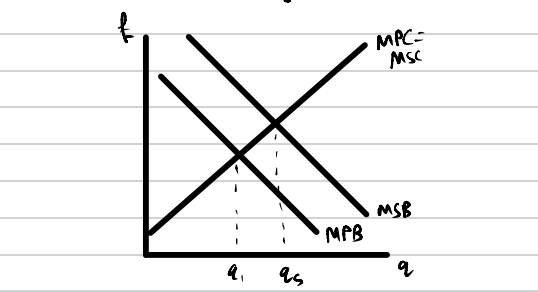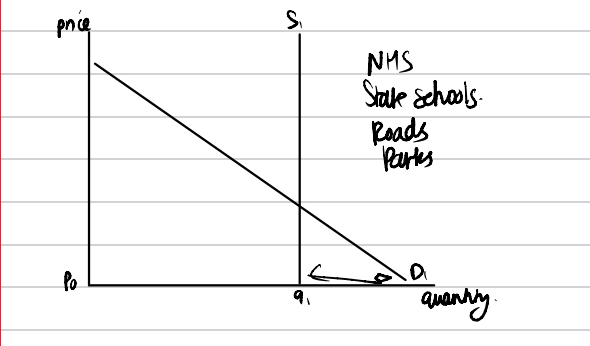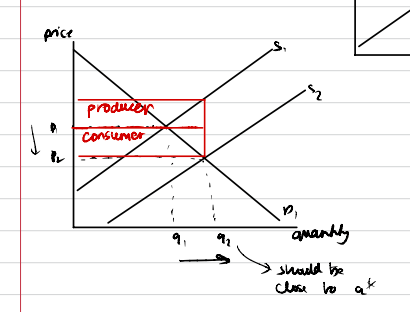Assess the view that high-speed Internet connection is a necessity for modern life and should be provided by the government, free of charge, to all households. (June 2022)
Plan
Paragraph 1
- Internet needs to and should be provided free by state because leaving it to free market leads to market failure
- Positive externalities ignored
- State provision diagram
- Only provided to those who are willing and able
- Evaluation: opportunity cost
Paragraph 2
- State provision leads to government failure
- Excess demand
- Poor quality
- Explain the benefits of leaving it to free market further
Paragraph 3
- There are alternative government interventions such as maximum price or subsidy
- They can also lead to government failure
Conclusion
Overall state provision is risky as there is not complete market failure.
Full Essay
High-speed internet connection could be argued to be both a necessity and a merit good, because it has positive externalities in consumption. The under-consumption of merit goods is a potential market failure, which would mean that government intervention is required. State provision has advantages and disadvantages as a potential solution, especially when compared to alternative government interventions or the possibility of leaving its provision to the free market.
The potential market failure in the internet market is due to the fact that the free market ignores the positive externalities of its consumption. The market mechanism only allocates resources to those who are willing and able to pay, however the socially optimum quantity of consumption is higher, as shown below.

The reason MSB is higher than MPB is because when more people have access to quality internet connection, they may be more productive at work, or may be able to connect with friends and family to a greater level, so there is a positive impact on third parties (those other than the buyer or the seller, such as the general taxpayer). Since there is a source of market failure (underconsumption of a merit good), the government should consider intervention to correct the misallocation of resources.
State provision is when the government provide a good or service free of charge to everyone, such as the free provision of healthcare in the form of the NHS, or the free provision of education, with state schools.

The diagram shows that supply becomes a perfectly inelastic curve showing the quantity (q1) of internet/ wi-fi services that the government are providing in the market, given their budget. Although in a free market there would be a price, the government are providing this free of charge, at p0. The benefit of this is that no matter what, there would be a guaranteed quantity of internet available for all, as well as no price being charged. The benefit of this can be fully understood when this is compared to the outcome which we saw in the free market. A free market is when price and quantity is determined solely by the forces of supply and demand, so those who are willing but not able to pay for quality internet connection would miss out on its consumption, and this can worsen inequality. For example, it could cause those people on lower incomes to be less productive, worsening inequality even more.
However, state provision would not be guaranteed to work, as there are some common sources of government failure. For example, there would be a huge opportunity cost of this provision, which would mean that the benefits would have to outweigh this. Also, the market gets distorted which would cause further problems.
The issue with state provision is that, if it is under-funded then supply would not be high enough to meet demand, which would be very high especially with a price of zero. Therefore, there would be an issue of excess demand. Government interventions usually distort markets and this is an example of that. If there is excess demand, as shown in the state provision diagram in the previous paragraph, there would be too many people asking for internet compared to what is provided by the government, so some people would still miss out, or quality would significantly fall. We see that, when schools, medical care, or some housing is state provided, it is of a far less quality than goods or services which are privately provided, due to the excess demand and the strain on the resources the government have to provide. In the case of free internet, this might relate to complaints about slow internet, or long wait-times to connect to customer services if there are any issues. This would defeat the aim from the question of providing "high-speed" internet to all.
In evaluation, those who are not satisfied with the lower quality internet connection may still opt to buy internet connection from a private provider, just like how some people to choose to pay for private healthcare or private education. This may reduce the strain on resources and allow the government to just be providing internet to those who really need it the most.
However, some may also argue that there are alternatives to state provision, or leaving internet connection completely to a free market, such as subsidies or maximum prices. This would mean that state provision should not be provided free for everyone, as there is a better alternative government intervention. A subsidy is a payment given to increase the supply of a good or service. This would lead to a price fall from p1 to p2 and an increase in consumption from q1 to q2, as shown below.

This allows us to move closer to the socially optimal quantity, and whilst it does have a high opportunity cost, the opportunity cost is going to be lower than that from state provision, as this is just some help to the producers to lower the prices. The issue is that it could be quite complicated to decide how much to subsidise, and which producers to subsidise. The producers would also become reliant on the susbidy so this may be necessary each year, so it is not a long term solution to the issue of expensive internet. A maximum price is another alternative that could force producers to charge a price below equilibrium but this also has a risk of government failure as it causes excess supply. State provision may be better reserved for when it is the only solution. This is to solve missing markets, caused when people free-ride on goods which are non-excludable, such as street lamps.
Overall, I believe that the provision of internet should be left to the free market and should not be state provided, particularly as there is not a missing market, and there is just a slight market failure due to under-consumption. Redistributive policies such as bursaries, benefits or lower tax rates could also allow consumers on lower incomes access better goods and services, and with the risk that state provision.